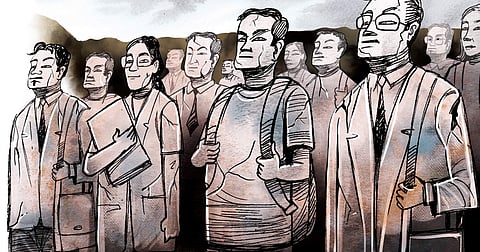

Each time the global listing of universities is announced, we seem stung that there isn’t a single Indian university among the top 200. The ripples of this disappointment disappear into oblivion soon. Nothing changes. It is as if we feel fated to stay stuck. But fatalism stems from the refusal to address causative factors, which inhibits remedial intervention. So, are there reasons why we stay stuck in this morass?
Perhaps the foremost reason is that we lack a proactive idea of what a university is meant to be. Our idea of ‘higher’ education is largely quantitative.
Students are made to cope with more information as they move from schools to colleges. So, they are in higher education. It rarely occurs to us that, at the level of higher education, information has to be handled differently. Today most associate our universities with teacher truancy and pedantry. Pedantry does not denote a preponderance of knowledge. It involves knowledge devoid of the radiance of imagination. Imagination is the faculty that transforms quantity into quality and imbues the warehousing of information with the delight of discovery. It is the ability, in the words of William Blake, to discern the universe in a particle of sand. The critical difference, as students shift to universities, must be qualitative, not quantitative. This is basic to promoting a culture of thinking—in the words of Matthew Arnold, ‘imaginative reason’—in students, which is the catalyst for progress.
The hallmark of an educated mind is not merely the plethora of information it masters, but the creative use it makes of expertise. In fact, knowledge becomes ‘expertise’ mainly through the power of imagination and an intuition of multi-disciplinary inter-connectivities. An outstanding journalist, for example, is not necessarily one who is most encyclopaedic in his knowledge-base, but one who has the breadth of vision and imaginative reason to treat specific events as part of a visionary whole with professional finesse.
He contributes to the art of journalism, without even being aware of it. Information, when enlivened by imagination, inspires the learner to intuit hidden horizons, which unfailingly inspires. Our universities suffer from the false stereotype that imagination is relevant only to instruction in ‘arts’ subjects. It is required even more in the sciences. If an apple had fallen on the head of anyone less imaginative, and more pedantic, than Isaac Newton, it would have yielded only a capital concussion and an ejaculation of expletives.
If imparting information is the sole purpose of a university, then it is at risk now of becoming obsolete. Plenty of information and high-quality educational resources are readily available on the web. It is doubtful if any teacher at any level of education can compete with it in this respect. Surprisingly, teachers in higher education refuse to wake up to this challenge. Taken aright, the internet could coerce teachers to discover that qualities of head and heart matter at least as much as disembodied information does.
The second reason for our persistent failure to produce universities of excellence is that the society as a whole—especially the state—has a cynically pedestrian idea about them. Of course, we boast of having had the earliest and best universities in the world. But aside of this nostalgic fix, we don’t have any living faith in the catalytic relevance of universities. The driving purpose of our educational enterprise is that education must resource the job market. We mistake this for deploying education as an agent for development!
Universities played a big role in the development of all advanced economies, especially the US. The Pilgrim Fathers, who left England in 1620, founded Harvard University as a matter of urgent priority. They were clear about the importance of the university in the development of a people. Universities were the reason for the steady progress of European nations in every field of knowledge. Politically correct statements apart, we don’t believe universities are decisive in activating and actualising the enormous potential of our people for the progress of our country. We think of higher education almost as the charity that the government grudgingly extends to citizens.
This cynical attitude is evident at all levels of maintaining and administering a university. Teacher-truancy is alarmingly high in most universities. This is a telltale index of the incompetence of teachers, for mediocre teachers cannot help being reluctant workers. It is fairly certain that if the teachers of our nearly 800 universities and over 42,000 colleges are assessed on global standards, not even 5 per cent would pass muster. This doesn’t seem to bother us. We assume mediocre teachers will, somehow, impart world-class education. The tragedy is not just that they are mediocre at the entry level, but that they stay so all the way through. There is no systemic pressure or ambient stimulation on them to improve. We are far away from developing a tradition of pursuing excellence in education.
Perhaps the worst disservice we do to our universities is via appointment of vice chancellors. Mediocre hands, never known to have inspired anyone, are implanted in universities for considerations other than their ability to provide academic leadership. Such appointments are made to infiltrate universities and to annex them by proxy. Nothing more needs to be done to consign our universities to drift, disarray and demoralisation.
These factors are merely suggestive and illustrative. Such other issues there are, and the many micro-issues around each of the bottlenecks here examined, are all remediable. For anything to happen in that direction, though, we need to exorcise ourselves of our subliminal fear that the spread of liberal education—especially the liberating and egalitarian ideals embedded in it—could nudge the country into unrest. The pressing need today is to redeem our higher education, rather than push its quantitative expansion for window-dressing educational statistics. We shall flourish, or perish, by the education we practise.
Valson Thampu
Former principal of St Stephen’s College, New Delhi
Email: vthampu@gmail.com